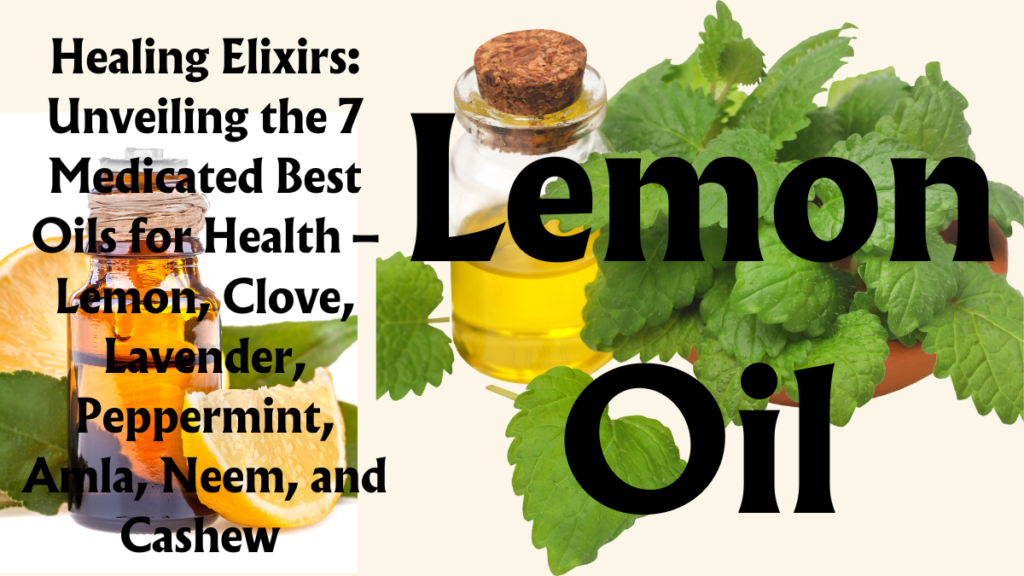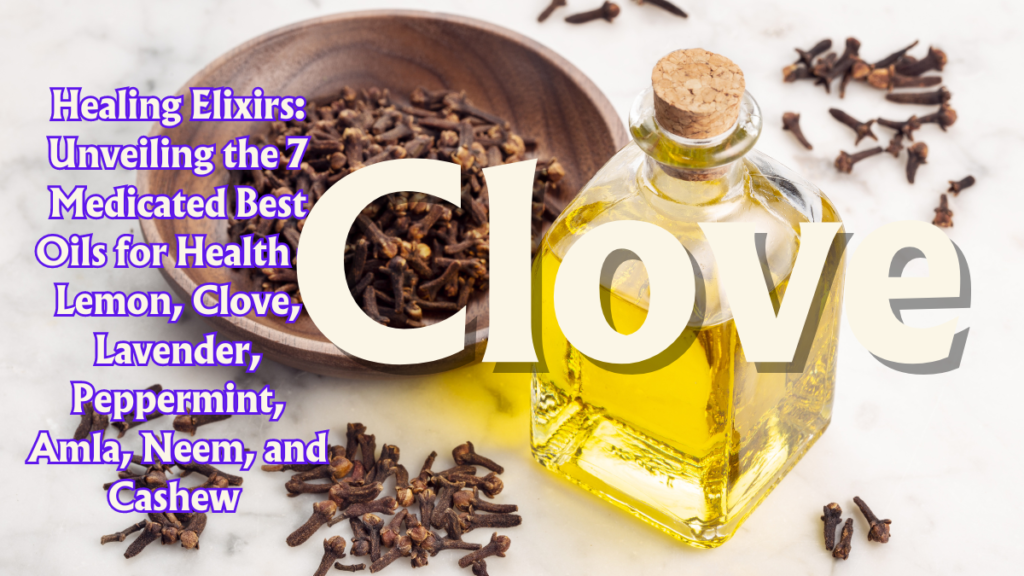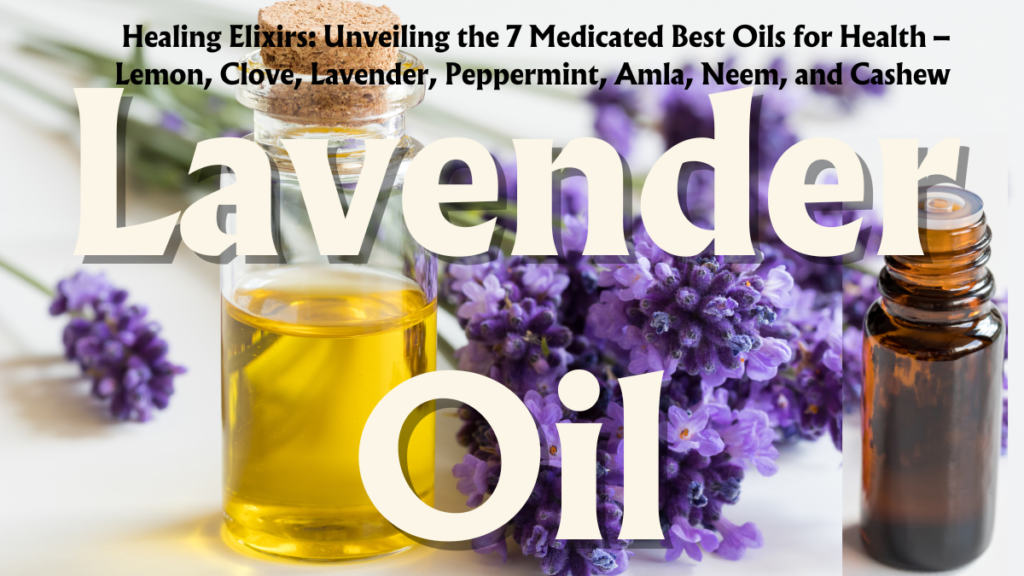Healing Elixirs: Unveiling the 7 Medicated Best Oils for Health – Lemon, Clove, Lavender, Peppermint, Amla, Neem, and Cashew (Part 1)
Healing Elixirs: Unveiling the 7 Medicated Best Oils for Health – Lemon, Clove, Lavender, Peppermint, Amla, Neem, and Cashew (Part 1)” dives into the extraordinary world of medicinal oils, offering an insightful exploration of each elixir’s unique properties.

From the refreshing zest of Lemon Oil to the aromatic warmth of Clove Oil, the soothing essence of Lavender Oil, the invigorating Peppermint Oil, the enriching Amla Oil, the powerful Neem Oil, to the nourishing Cashew Oil – this guide unveils their sources, benefits, and the remarkable impact they can have on your well-being.
Embark on a journey of holistic health as we uncover the therapeutic secrets of these seven medicated oils, paving the way for a healthier and more balanced lifestyle.
Lemon Oil: Best Cooking Oils for Healthy Food, Source, and Benefits
Introduction
Lemon oil, extracted from the peel of lemons, is a flavorful and aromatic addition to the world of cooking oils. Beyond its delightful scent, lemon oil brings a burst of citrusy freshness to various culinary creations. In this article, we will explore the sources, benefits, and creative uses of lemon oil in enhancing both the flavor and nutritional profile of your dishes.
Understanding Different Types of Cooking Oils
While lemon oil is not a traditional cooking oil in the conventional sense, its incorporation into the culinary landscape allows for a unique exploration of flavors. From olive oil to coconut oil, each type contributes distinct tastes and characteristics to diverse dishes. Lemon oil, however, stands out for its vibrant citrus essence.

Benefits of Lemon Oil
1. Antioxidant Properties
– Lemon oil contains antioxidants, such as limonene, which may help neutralize free radicals in the body, supporting overall health.
2. Refreshing Flavor Without Calories
– Incorporating lemon oil into your dishes adds a burst of citrus flavor without the need for added calories, making it an excellent option for those mindful of their caloric intake.
3. Potential Digestive Aid
– The aroma of lemon oil is believed to have potential digestive benefits. Its refreshing scent may stimulate the production of digestive enzymes, aiding in digestion.
4. Versatile Culinary Use
– Lemon oil’s versatility extends beyond traditional cooking. It can be used in various culinary applications, from salad dressings to marinades and desserts.
Incorporating Lemon Oil into Your Culinary Repertoire
1. Citrusy Salad Dressings
– Create vibrant salad dressings by combining lemon oil with olive oil, Dijon mustard, honey, and a dash of salt and pepper. Drizzle over your favorite salads for a zesty touch.
2. Marinating Poultry or Seafood
– Infuse lemony goodness into poultry or seafood by using lemon oil as a marinade. Combine it with herbs, garlic, and other seasonings for a refreshing flavor profile.
3. Flavorful Roasted Vegetables
– Toss your favorite vegetables in a mixture of lemon oil, garlic, and herbs before roasting. The lemony essence will complement the natural flavors of the vegetables.
4. Lemon-Infused Desserts
– Add a citrus twist to desserts by incorporating lemon oil into cake batters, frosting, or drizzling it over fruit salads. It brings a bright and uplifting flavor to sweet treats.
Considerations for Lemon Oil Usage
1. Quality and Purity
– Choose high-quality, food-grade lemon oil to ensure purity and safety for consumption. Look for products specifically labeled for culinary use.
2. Moderation in Use
– Due to its concentrated flavor, use lemon oil sparingly. A little goes a long way, and adding too much may overpower the dish.
Conclusion
Lemon oil, with its vibrant citrus flavor and potential health benefits, is a delightful addition to the culinary world. Its versatility allows for the creative exploration of various dishes, adding a refreshing and aromatic touch to your meals.
FAQs:
1. Can I use lemon oil for cooking at high temperatures?
– Lemon oil is best used in low to medium-heat cooking or added to dishes after cooking. High temperatures may alter its flavor profile, and it’s more commonly used for its aromatic and flavor-enhancing qualities.
2. Is there a difference between lemon oil and lemon extract?
– Yes, lemon oil is typically cold-pressed from the peel of lemons, capturing the essential oils and natural flavors. Lemon extract, on the other hand, is often made by soaking lemon zest in alcohol, providing a different flavor profile.
3. Can I use lemon oil in baking?
– Yes, lemon oil can be used in baking to infuse a lemony flavor into cakes, cookies, and other desserts. It adds a concentrated citrus essence that enhances the overall taste.
4. Does lemon oil provide nutritional benefits?
– Lemon oil contains antioxidants, such as limonene, which may offer some health benefits. However, it is essential to consume it in moderation, considering its concentrated nature.
5. Can I make my lemon oil at home?
– Yes, you can infuse olive oil with lemon zest at home to create a lemon-infused oil. However, this is different from commercially available lemon oil, which is more concentrated and specifically extracted for culinary use.
Clove Oil: Best Cooking Oils for Healthy Food, Source, and Benefits
Introduction
Clove oil, derived from the dried flower buds of the clove tree, is a potent and aromatic essential oil that has found its way into the culinary world. Beyond its traditional uses in medicine and aromatherapy, clove oil can impart a unique and warming flavor to various dishes. In this article, we’ll explore the sources, benefits, and creative applications of clove oil in cooking.

Understanding Different Types of Cooking Oils
While clove oil isn’t a conventional cooking oil, its inclusion in the culinary realm adds a distinct and flavorful element to dishes. From olive oil to coconut oil, various oils contribute unique tastes and characteristics to different cuisines. Clove oil, with its rich and spicy profile, stands out for its potential to enhance both sweet and savory recipes.
Benefits of Clove Oil
1. Antioxidant Properties
– Clove oil contains compounds with antioxidant properties, which may help combat oxidative stress and inflammation in the body.
2. Antibacterial and Antifungal Qualities
– Clove oil has long been recognized for its antibacterial and antifungal properties, making it a potential ingredient for promoting oral health and preventing infections.
3. Warming Flavor Profile
– In culinary applications, clove oil contributes a warm and spicy flavor that pairs well with both sweet and savory dishes, adding depth and complexity to the overall taste.
4. Aromatic Influence
– The aromatic nature of clove oil can influence the overall sensory experience of a dish, providing a comforting and familiar scent that enhances the dining experience.
Incorporating Clove Oil into Your Culinary Repertoire
1. Spiced Desserts
– Add a touch of warmth to desserts like cakes, cookies, or puddings by incorporating a small amount of clove oil into the batter. It pairs particularly well with flavors like cinnamon and nutmeg.
2. Mulled Beverages
– Enhance the flavor of mulled beverages such as cider or wine by adding a drop of clove oil to the mixture. The spicy notes will complement the other warming spices in the drink.
3. Savory Dishes
– Use clove oil sparingly in savory dishes, especially those with a rich or hearty profile. It can be a unique addition to stews, marinades, or sauces, imparting a subtle spicy undertone.
4. Infused Syrups
– Create infused syrups by combining clove oil with simple syrup. This can be drizzled over pancakes, and waffles, or used as a sweetener in beverages, providing a hint of clove flavor.
Considerations for Clove Oil Usage
1. Dilution and Moderation
– Clove oil is highly concentrated, and a little goes a long way. Always dilute it before use and start with a small amount, gradually adding more to achieve the desired level of flavor.
2. Quality and Purity
– Choose high-quality, food-grade clove oil from reputable sources to ensure purity and safety for culinary use.
Conclusion
Clove oil, with its distinctive flavor and potential health benefits, offers a unique and aromatic dimension to various culinary creations. When used thoughtfully and in moderation, it can elevate the taste and sensory experience of both sweet and savory dishes.
FAQs:
1. Can I use clove oil in baking?
– Yes, clove oil can be used in baking to add a warm and spicy flavor to desserts. It pairs well with other baking spices like cinnamon, nutmeg, and ginger.
2. Is clove oil safe for consumption?
– Yes, food-grade clove oil is safe for consumption when used in moderation. It’s important to dilute it and start with small amounts, as the oil is highly concentrated.
3. What dishes pair well with clove oil?
– Clove oil complements both sweet and savory dishes. It works well in spiced desserts, mulled beverages, and savory dishes like stews and marinades.
4. Can clove oil be used in beverages?
– Yes, clove oil can be used to enhance the flavor of beverages, especially mulled drinks or infused syrups for cocktails and non-alcoholic beverages.
5. Does clove oil have any health benefits when used in cooking?
– While clove oil contains compounds with potential health benefits, the amounts used in cooking may not provide significant therapeutic effects. Its primary role in culinary use is to add flavor and aroma to dishes.
Lavender Oil: Best Cooking Oils for Healthy Food, Source, and Benefits
Introduction
Lavender oil, extracted from the lavender plant’s flowers, is renowned for its aromatic and calming properties. While primarily known for its use in aromatherapy and skincare, lavender oil can also be subtly incorporated into certain culinary creations. In this article, we’ll explore the sources, benefits, and creative applications of lavender oil in cooking.

Understanding Different Types of Cooking Oils
While lavender oil isn’t a conventional cooking oil, its inclusion in the culinary world allows for unique explorations of flavor. From olive oil to coconut oil, different oils contribute distinct tastes and characteristics to a variety of dishes. Lavender oil, with its floral and fragrant profile, can provide a subtle and aromatic addition to select recipes.
Benefits of Lavender Oil
1. Aromatic Influence
– Lavender oil is celebrated for its calming and soothing aroma. In culinary applications, its aromatic nature can influence the overall sensory experience of a dish, creating a pleasant and relaxing ambiance.
2. Subtle Floral Flavor
– When used sparingly, lavender oil can impart a delicate floral flavor to certain dishes. Its subtle notes can enhance both sweet and savory recipes, adding a unique touch to the culinary palette.
3. Potential Relaxation Benefits
– While primarily recognized for its calming effects in aromatherapy, the consumption of lavender-infused dishes may offer a subtle sense of relaxation and tranquility.
Incorporating Lavender Oil into Your Culinary Repertoire
1. Lavender-Infused Desserts
– Add a touch of elegance to desserts like shortbread cookies, lemon cakes, or custards by incorporating a small amount of lavender oil. It pairs well with citrus flavors and enhances the overall sweetness.
2. Herb-Infused Salads
– Create herb-infused salad dressings by blending lavender oil with olive oil, honey, and a hint of lemon juice. Drizzle over fresh greens for a unique and aromatic salad experience.
3. Lavender-Infused Beverages
– Elevate your beverages by adding a drop of lavender oil to lemonades, teas, or cocktails. The floral notes can provide a refreshing twist, transforming ordinary drinks into sophisticated sips.
4. Savory Lavender Pairings
– Experiment with lavender oil in savory dishes by incorporating it into marinades for poultry or drizzling over roasted vegetables. Its subtle floral essence can complement a variety of flavors.
Considerations for Lavender Oil Usage
1. Quality and Purity
– Choose high-quality, food-grade lavender oil from reputable sources to ensure purity and safety for culinary use. Avoid using essential oils that may contain additives or fillers.
2. Moderation in Use
– Due to its concentrated nature, use lavender oil sparingly. A small amount can go a long way in providing a delicate floral flavor without overpowering the dish.
Conclusion
Lavender oil, with its aromatic charm and subtle floral notes, offers a unique way to enhance the culinary experience. When used thoughtfully and in moderation, it can bring a touch of sophistication to both sweet and savory dishes.
FAQs:
1. Can lavender oil be used in cooking?
– Yes, lavender oil can be used in cooking, particularly in desserts and beverages. Its floral notes add a unique flavor profile to dishes when used in moderation.
2. What desserts pair well with lavender oil?
– Lavender oil pairs well with desserts like shortbread cookies, lemon cakes, custards, and other baked goods. It complements citrus flavors and adds a subtle floral touch.
3. How can lavender oil be used in savory dishes?
– Lavender oil can be used in savory dishes by incorporating it into marinades for poultry, drizzling over roasted vegetables, or adding a drop to herb-infused dressings for salads.
4. Can lavender oil be used in beverages?
– Yes, lavender oil can be added to beverages such as lemonades, teas, and cocktails to provide a refreshing and floral twist. Start with a small amount and adjust to taste.
5. Does lavender oil offer any health benefits when used in cooking?
– While lavender oil is primarily known for its aromatic and relaxation-inducing properties, its culinary use may provide a subtle sense of tranquility. However, the amounts used in cooking are typically not significant for therapeutic effects.
https://en.wikipedia.org/wiki/Aromatherapy
Fish Oil: Best Cooking Oils for Healthy Food, Source, and Benefits (Part 6)






